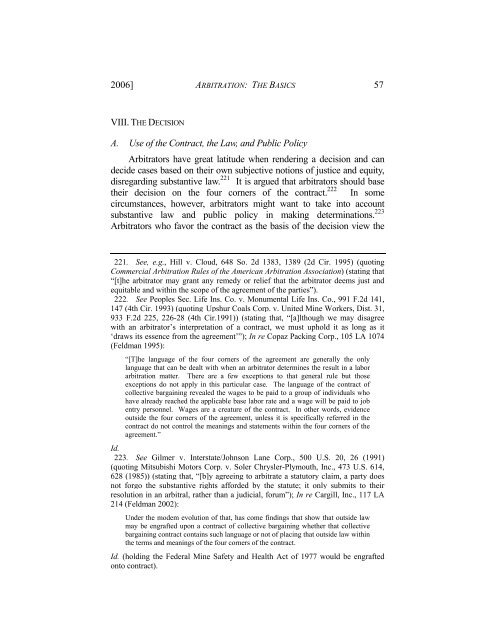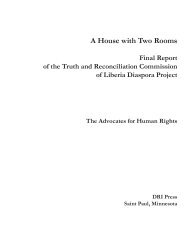2006/Vol. 5 No.1 - Hamline Law - Hamline University
2006/Vol. 5 No.1 - Hamline Law - Hamline University
2006/Vol. 5 No.1 - Hamline Law - Hamline University
Create successful ePaper yourself
Turn your PDF publications into a flip-book with our unique Google optimized e-Paper software.
<strong>2006</strong>] ARBITRATION: THE BASICS 57<br />
VIII. THE DECISION<br />
A. Use of the Contract, the <strong>Law</strong>, and Public Policy<br />
Arbitrators have great latitude when rendering a decision and can<br />
decide cases based on their own subjective notions of justice and equity,<br />
disregarding substantive law. 221 It is argued that arbitrators should base<br />
their decision on the four corners of the contract. 222 In some<br />
circumstances, however, arbitrators might want to take into account<br />
substantive law and public policy in making determinations. 223<br />
Arbitrators who favor the contract as the basis of the decision view the<br />
221. See, e.g., Hill v. Cloud, 648 So. 2d 1383, 1389 (2d Cir. 1995) (quoting<br />
Commercial Arbitration Rules of the American Arbitration Association) (stating that<br />
“[t]he arbitrator may grant any remedy or relief that the arbitrator deems just and<br />
equitable and within the scope of the agreement of the parties”).<br />
222. See Peoples Sec. Life Ins. Co. v. Monumental Life Ins. Co., 991 F.2d 141,<br />
147 (4th Cir. 1993) (quoting Upshur Coals Corp. v. United Mine Workers, Dist. 31,<br />
933 F.2d 225, 226-28 (4th Cir.1991)) (stating that, “[a]lthough we may disagree<br />
with an arbitrator’s interpretation of a contract, we must uphold it as long as it<br />
‘draws its essence from the agreement’”); In re Copaz Packing Corp., 105 LA 1074<br />
(Feldman 1995):<br />
“[T]he language of the four corners of the agreement are generally the only<br />
language that can be dealt with when an arbitrator determines the result in a labor<br />
arbitration matter. There are a few exceptions to that general rule but those<br />
exceptions do not apply in this particular case. The language of the contract of<br />
collective bargaining revealed the wages to be paid to a group of individuals who<br />
have already reached the applicable base labor rate and a wage will be paid to job<br />
entry personnel. Wages are a creature of the contract. In other words, evidence<br />
outside the four corners of the agreement, unless it is specifically referred in the<br />
contract do not control the meanings and statements within the four corners of the<br />
agreement.”<br />
Id.<br />
223. See Gilmer v. Interstate/Johnson Lane Corp., 500 U.S. 20, 26 (1991)<br />
(quoting Mitsubishi Motors Corp. v. Soler Chrysler-Plymouth, Inc., 473 U.S. 614,<br />
628 (1985)) (stating that, “[b]y agreeing to arbitrate a statutory claim, a party does<br />
not forgo the substantive rights afforded by the statute; it only submits to their<br />
resolution in an arbitral, rather than a judicial, forum”); In re Cargill, Inc., 117 LA<br />
214 (Feldman 2002):<br />
Under the modem evolution of that, has come findings that show that outside law<br />
may be engrafted upon a contract of collective bargaining whether that collective<br />
bargaining contract contains such language or not of placing that outside law within<br />
the terms and meanings of the four corners of the contract.<br />
Id. (holding the Federal Mine Safety and Health Act of 1977 would be engrafted<br />
onto contract).
















